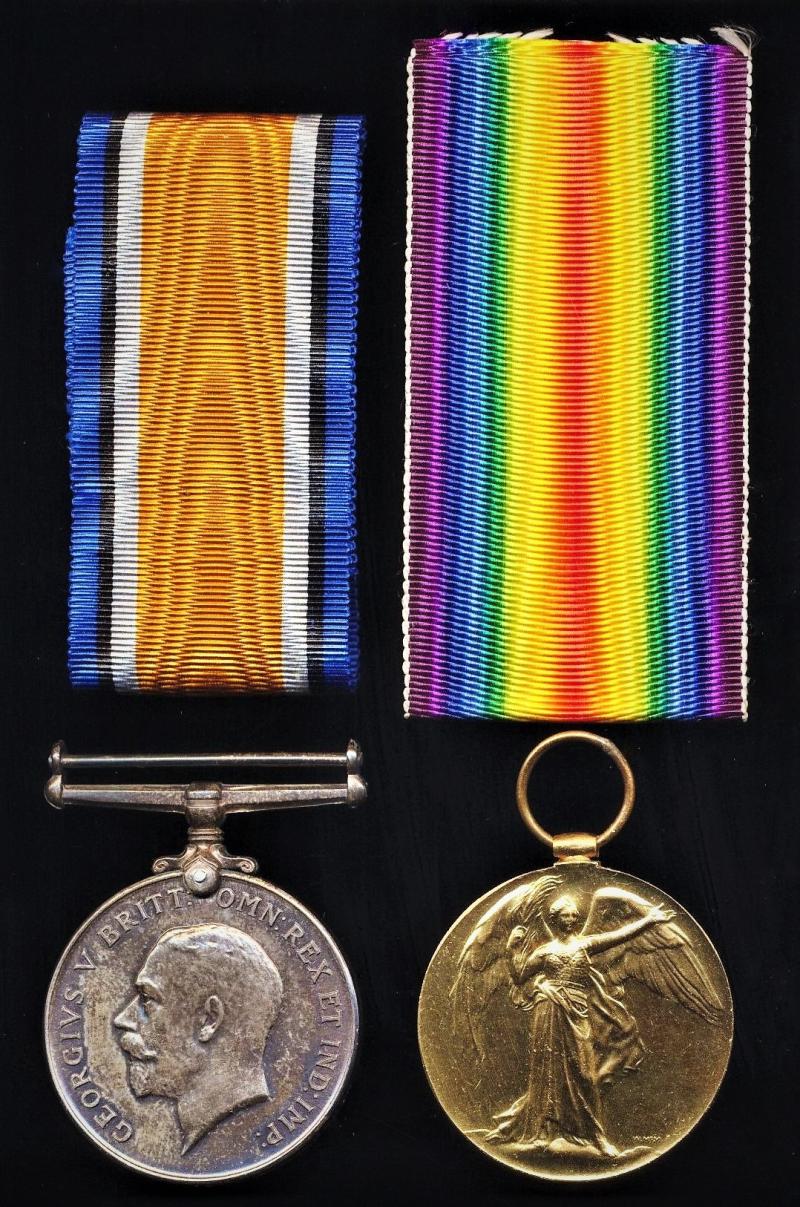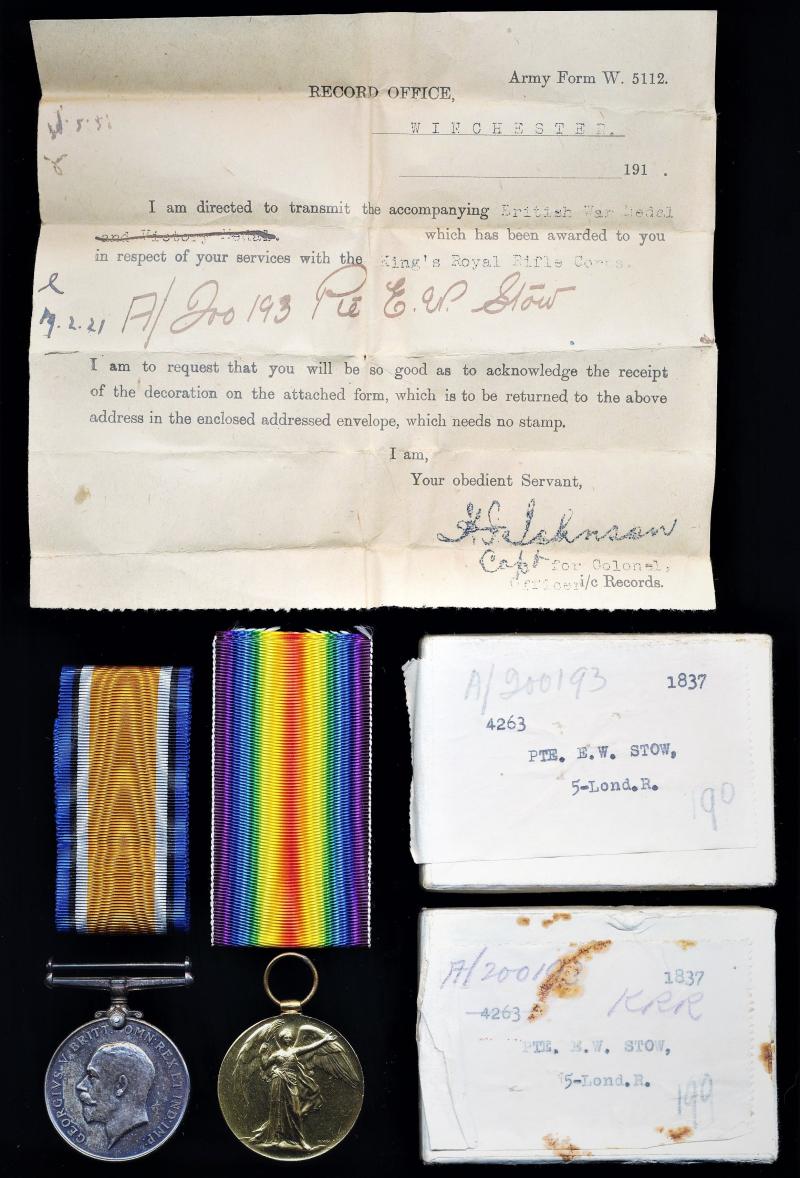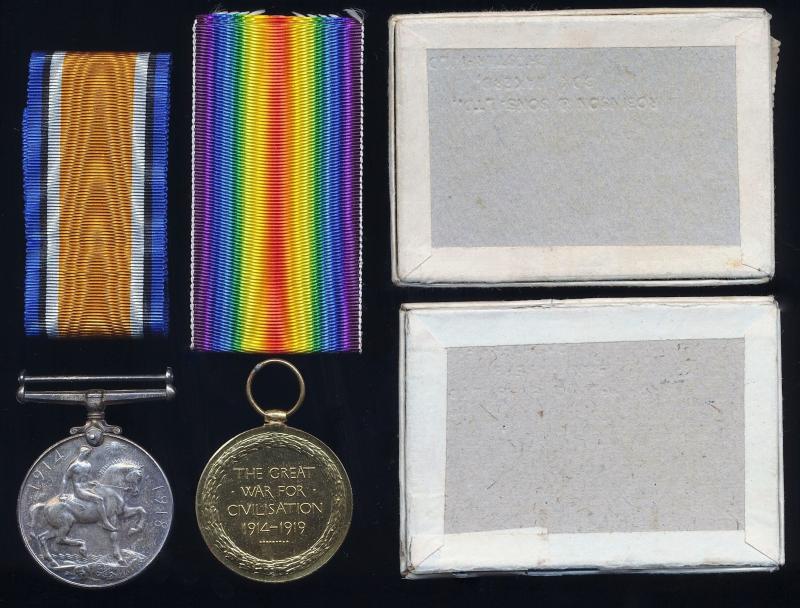A Londoner's 'Pristine' Great War 'Casualty' pair of medals: Private Ernest William Stow, 17th Battalion King's Royal Rifle Corps late 5th (City of London) Battalion London Regiment (London Rifle Brigade)
- British War Medal. Silver issue (4263 Pte. E. W. Stow. 5-Lond. R.)
- Interallied Victory Medal (4263 Pte. E. W. Stow. 5-Lond. R.)
Sold together with below following:
a). Official card boxes of issue (a/f) for the medals, these each with named label (4263 Pte. E. W. Stow. 5-Lond. R.)
b). Army Form W 5112 (19/02/1921) acknowledgement receipt for medals signed by a Capt. Felshnson K.R.R.C., for the Colonel.
c). Notice pertaining to issuance of the Interallied Victory Medal
Wounded-in-Action: Private Ernest William Stow, 17th Battalion King's Royal Rifle Corps is confirmed having been 'Wounded-in-Action' in France, August 1917, while serving with 17th Battalion King's Royal Rifle Corps (ref MH 106/474)
Medals Verification: The Great War campaign medals all verified as issued per the respective medal rolls of the King's Royal Rifle Corps, as under:
- British War Medal. Silver issue: Ref WO 329/1523 (shows first entered a theatre of war, with 1/5 London Regiment, later No. A/200193 17th K.R.R.C.)
- Interallied Victory Medal: Ref WO 329/1523 (shows first entered a theatre of war, with 1/5 London Regiment, later No. A/200193 17th K.R.R.C.)
Ernest Albert Stow son of William Stow (a Carpenter) & Emily Stow was a native of Pimlico, London, England, where he was born on, 3 January 1876. At the time of the 1881 National Census for England and Wales, Ernest is shown as living with his parents and - at the time - 2 x sibling sisters (Elizabeth J. Stow & Alice M. Stow) residing at, 35 Ebury Buildings, St George Hanover Square Belgravia, London, England. By the time of the 1911 National Census, the Stow family had relocated to, 30 Chester Terrace, London, SW, at which time William is recorded as a 'Hospital Clerk', and living at home with his widowed mother, and youngest sister, Edith Emily Stow (a School Teacher with the London County Council)
During the Great War, Ernest enlisted in the British Army on, 20 November 1915, at which time he was posted to the 5th (City of London) Battalion London Regiment (London Rifle Brigade). After completion of his basic training, was sometime in April 1916, sent to join 1/5 London Regiment in France, and was serving with the 1/5 London's when he first entered a theatre of war. Ernest was later transferred to the 17th Battalion King's Royal Rifle Corps, with which latter unit he held the regimental number 200193. Ernest, is confirmed being 'Wounded-in-Action' during August 1917. Extant War Office: First World War Representative Medical Records of Servicemen (ref MH 106/474), show that Ernest Stow (40 years of age, who had served 15 months in France with the BE.F.) was admitted to the No 11 Casualty Clearing Station, where he was treated for multiple 'Shrapnel' wounds to, left side and face, legs, thighs and left foot. The nature of the wounds were so debilitating that Ernest took his discharge from the British Army on, 21 November 1918, and was awarded a 'Silver War Badge'
After taking his discharge from the British Army, Ernest returned to his career as a 'Hospital Clerk'. By the time of the compilation of the 1939 National Register for England & Wales, he is recorded living at, 3 Granard Road, London, SW12, and described as 'Hospital Clerk (Retired)'. Ernest died at Kings College Hospital, Camberwell, London, on, 1 May 1949
The medals each retaining their original bright long lengths of folded silk watered 'moire' ribands, as issued, and the medals near pristine
A choice lot to the London Rifle Brigade
Condition: EF
Code: 22614







